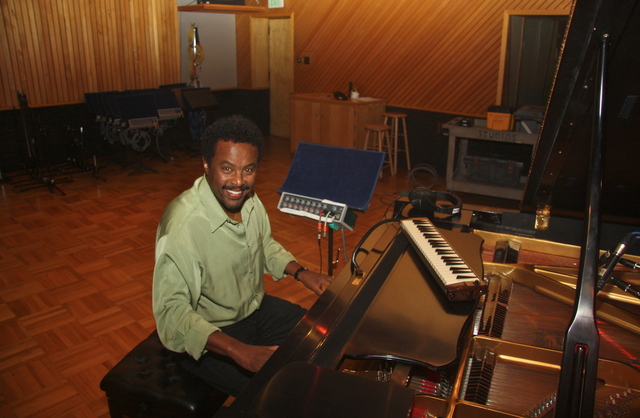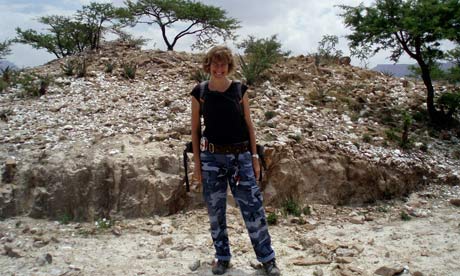This is not an ordinary story, simply because Sintayehu
"Ty" Fleming is not an ordinary teenager.
 |
| OPRF student-athlete Sintayehu "Ty" Fleming says participating in sports such as wrestling, football, baseball and hockey has helped him adjust to life from his days as an orphan in Ethiopia. |
To start from the beginning would be too conventional, and
there's been nothing too conventional about the first 18 years of this kid's
life. We begin here and now with Ty in his senior year at Oak Park and River
Forest High School. He has just finished placing second in his weight class
(138 pounds) at the junior varsity conference wrestling meet.
"It's satisfying," he says, "but not too
satisfying. I could have done better. Overall, I'd say it was a successful
season."
Before long, he'll go home and help get his three younger
siblings fed and put to bed. He'll clear the table, wash the dishes, take the
trash out, walk the dog. He'll prepare the medicine his brother and sister must
take every day because they're HIV positive. He'll plug his mind into a book on
philosophy (John Locke) or a medical journal. He'll then go to bed and be up
again at 5 a.m. to walk to school, work out, and receive extra help from
teachers. If it's the weekend, he'll take his siblings to the park. Ty Fleming
is not your average teen.
While others listened to their iPods or chatted up the
latest pop culture craze on the bus trips to wrestling meets throughout the
season, Ty would usually be busy studying.
"He would have his face planted in a book between
matches if he could," says OPRF head wrestling coach Mike Powell.
"He's got grit. He's a true survivor. And the best thing about it is he
knows where he's going."
Ty is going to college and then, hopefully, medical school
and then, hopefully, back to Ethiopia, where he was born and spent the first
six years of his life — a difficult six years. Back then he didn't have any idea
where he was going.
It is custom in Ethiopia for a young son to wash his
father's hands before a meal. Ty remembers doing this in the hut made of mud
and straw where he lived in the village of Bahir Dar. That's about it as far as
any memory of his father, who died in the war between Ethiopia and Eritrea in
the 1990s when Ty was 4. His mother remarried but died a year later while
giving birth in the hut made of mud and straw. Ty remembers this too.
He had just four years with his biological parents. He spent
a year living with his stepfather and his stepfather's girlfriend, but it was a
rough go.
"I was afraid living there and it was very
lonesome," he recalls. "I had one friend and he had a club foot. We
would go about stealing wood, but he would always get caught because he
couldn't run well."
Ty was placed in an orphanage at the age of 6. He played
soccer on a small enclosed driveway to pass the time.
"In the orphanage there was little schooling," he
recalls. "We had a 10x10 room we sat in, but we didn't do much in
there."
After a year, a woman named Margaret Fleming and her adopted
son, Nathan, showed up. A former social worker and founder of Adoption-Link in
Oak Park, Fleming had seen a photo of Ty in a newsletter. "It was kind of
mystical," she says. "Something just said I need to do what I can for
this child."
But her age, 65, was a problem. She was thought to be too
old to adopt Ty. "I refused to give up," she says. "I wrote
letters and sent packages, and then one day we received a call to come get
him."
It was a cold, dark night, she recalls, and the little boy
was shivering under a big coat.
"He knew no English whatsoever," she recalls.
"He was withdrawn, wouldn't hold my hand, scared and confused. He was so
beat up. He had been scalded by his [stepfather's girlfriend] with burning oil,
bitten by dogs and had tics embedded in his fingernails. He was seriously
malnourished."
On the way home, they stopped in Germany, where Ty
celebrated his seventh birthday. "That night he got to pick out a present
and he chose a little Volkswagen match-box car," Fleming remembers.
But as soon as they pulled up to her home on the 900 block
of North Taylor Avenue in Oak Park, things got bad. Ty felt as if he had been
kidnapped.
"He panicked, kicking and screaming. He was grief
stricken," says Fleming. "He missed his friends at the orphanage. It
was a hard adjustment, it took more than seven months and it nearly tore the
family apart. He was hitting, kicking, screaming and spitting. He was
intolerable."
Ty's behavior got him kicked out of Hatch Elementary School,
and Fleming came to the brink of rescinding the adoption. "Luckily,"
she says, "we persevered."
And then Ty found sports — a release, a distraction,
something that helped him realize he was in a better place with a better
opportunity.
He began with baseball. "I walked up to the batter's
box for the first time, got ready to hit and I had the bat upside down,"
he remembers. "But I loved playing baseball. I was on a traveling team for
a while and we went everywhere."
Similar to understanding and speaking English, which began
by reading Itsy Bitsy Spider, sports had to be learned, and Ty, as mentioned
earlier, is a voracious learner.
He stayed with baseball all the way up to his sophomore year
of high school. Hockey he played until his freshman year, soccer from third
grade to fifth grade, football from fifth grade to junior year. He's been
wrestling for the last three years.
Ty's an ardent Red Wings fan — "I get a lot of criticism
for that," he says — and a devoted Cubs fan. "It's gonna
happen," he believes.
His goal right now is to get into a good college where he
can study hard and realize his dream of becoming a neurosurgeon. He's applied
to 10 schools and has been accepted at three thus far: Ursinus College (Pa.),
Bradley and Indiana. He's leaning toward Ursinus and also Cornell, which has
yet to reply.
Fleming, now 75, has this to say about Ty leaving for
college: "I am tearful when I think about it. He is the heart of this
family, but we love him enough to know we must let him go."
Ty on leaving his mother and his siblings: "My mom is
one of the most important people in my life. I tell her every Mother's Day that
she saved my life. It will be difficult to leave her and my brothers and
sisters, but it will work out in the end."
As for a return to Ethiopia, Ty says he had the opportunity
to go back for a visit last year but wasn't ready.
"There will come a time when I will go back to help
people," he says.


















